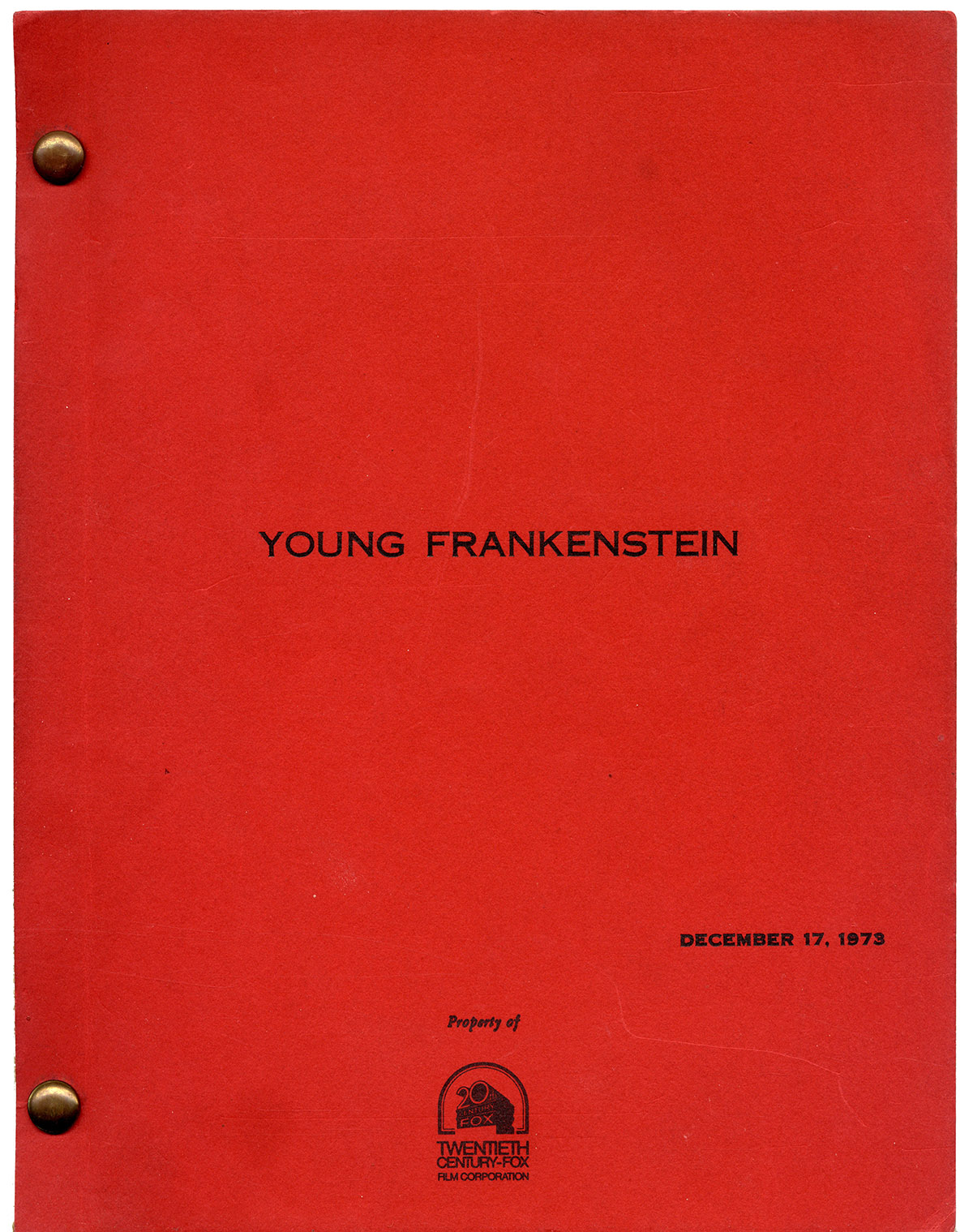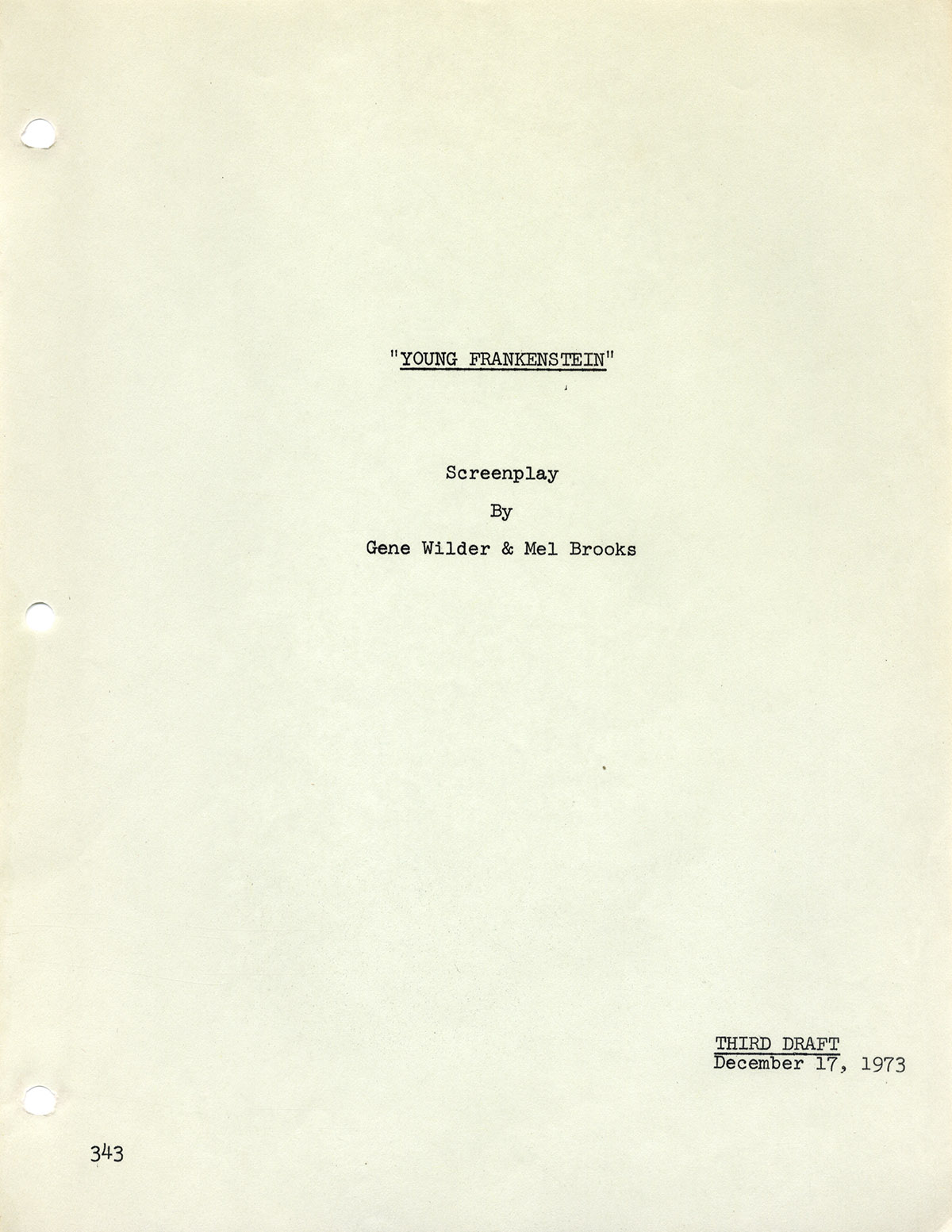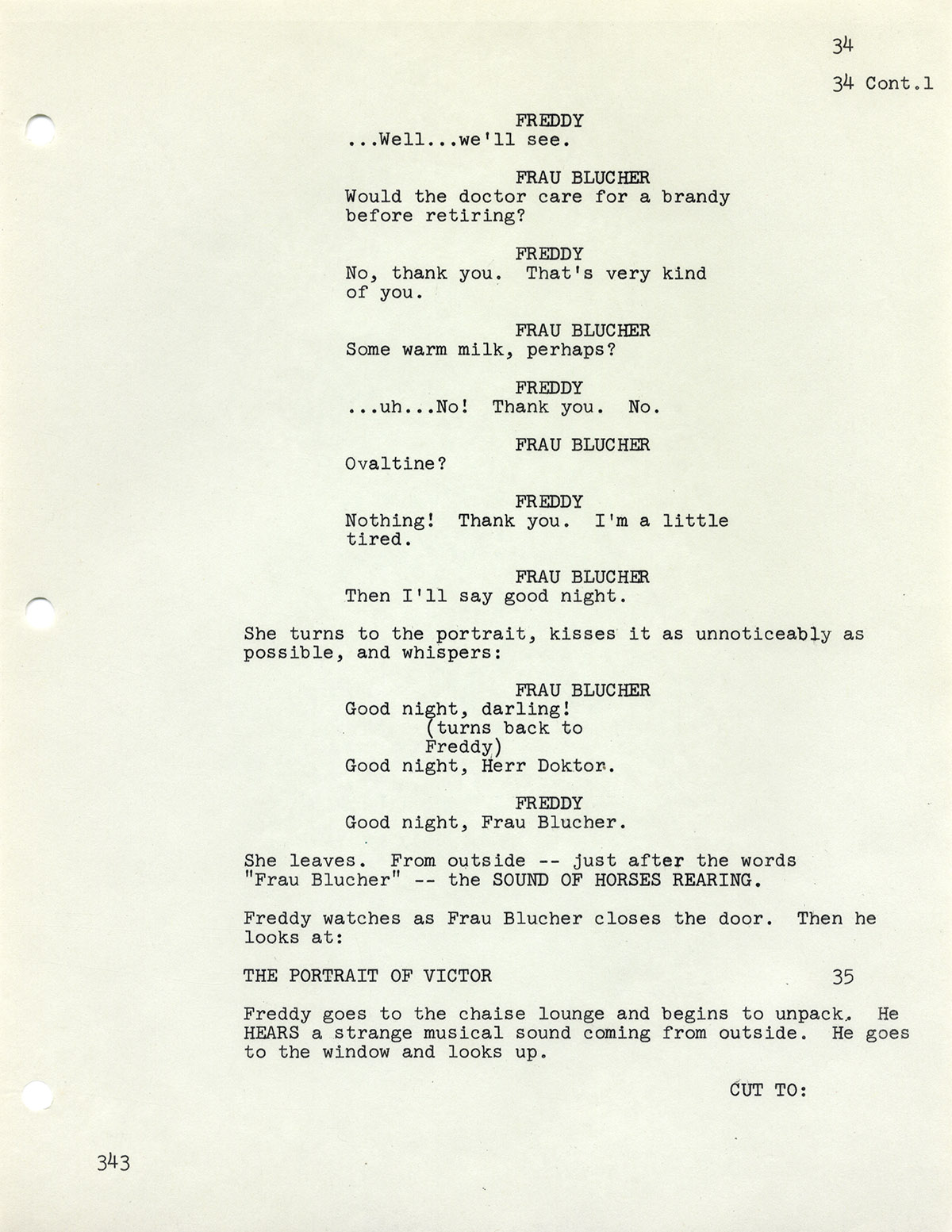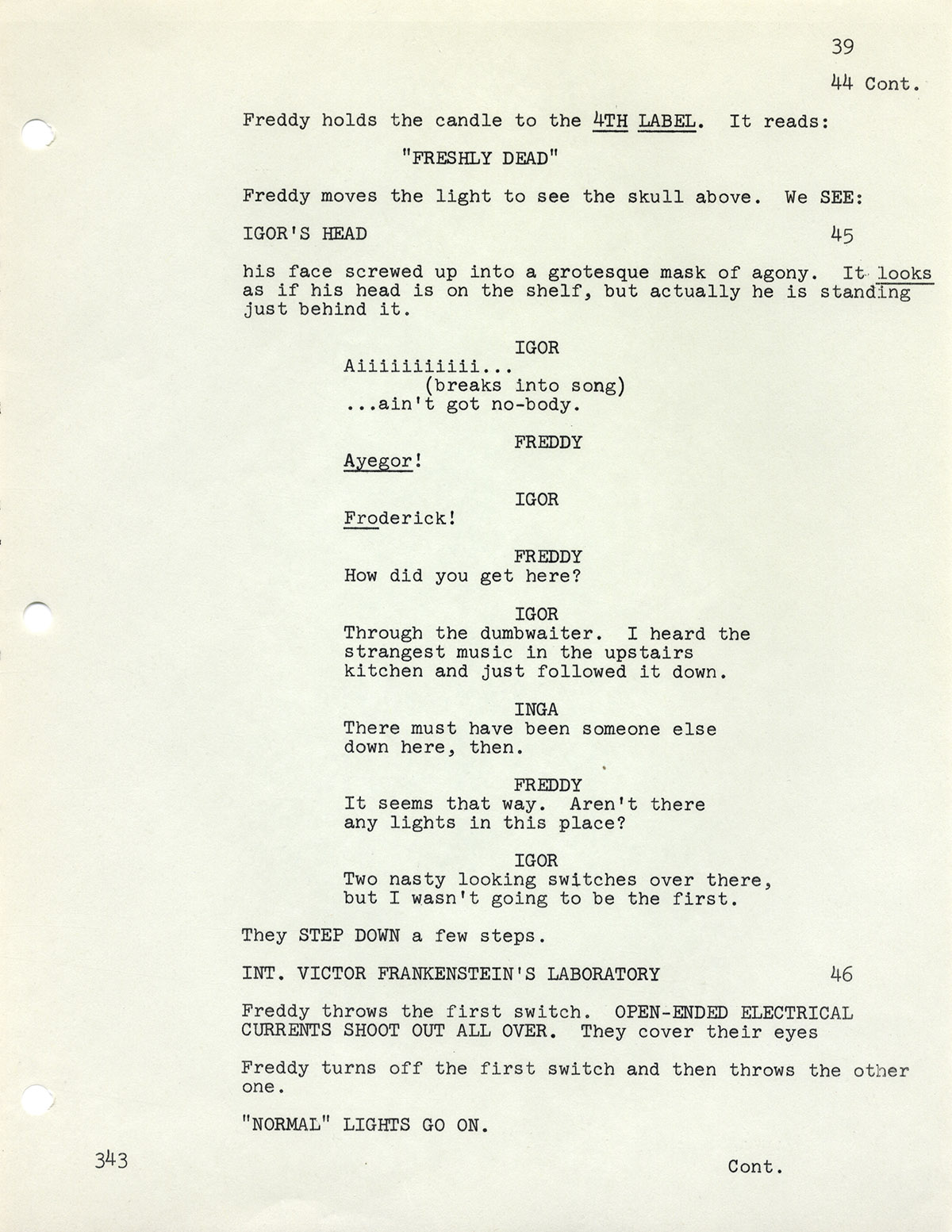YOUNG FRANKENSTEIN (1973) Third Draft screenplay by Gene Wilder & Mel Brooks dated Dec. 17, 1973
[Hollywood]: Twentieth Century Fox, December 17, 1973. Vintage original film script, quarto, printed wrappers, brad bound, mimeograph, 137 pp., wrappers slightly creased, title written on spine, overall JUST ABOUT FINE.
Forty-six years after its release, YOUNG FRANKENSTEIN retains its reputation as one of the funniest comedies ever made and very likely writer/director Mel Brooks’ finest film. What elevates YOUNG FRANKENSTEIN above almost every other Mel Brooks movie is its painstaking recreation of the look and feel of the films it pastiches (the Universal Studios Frankenstein movies directed by James Whale, et al.), Gerald Hirschfeld’s crystalline black & white cinematography, an inspired cast, and, above all, the exceptional quality of the movie’s screenplay, which is as much the work of co-author/star Gene Wilder as it is of director Brooks. Though Wilder originated the idea, it was clearly a passion project for both of them.
YOUNG FRANKENSTEIN was the third on-screen collaboration of Gene Wilder and Mel Brooks, following Wilder’s roles in Brooks’ THE PRODUCERS (1967) and BLAZING SADDLES (1974). After YOUNG FRANKENSTEIN, Wilder went on to write, star in, and direct several films of his own, including THE ADVENTURE OF SHERLOCK HOLMES’ SMARTER BROTHER (1975) and HAUNTED HONEYMOON (1986), co-starring his wife, Gilda Radner.
The film’s title is a play on the 1972 film YOUNG WINSTON, Richard Attenborough’s epic about the young Winston Churchill, which happened to feature Brooks’ spouse, Anne Bancroft, as Churchill’s mother.
At the heart of all of Brooks’ best films is a male friendship. In THE PRODUCERS, it was producer Max Bialystock and his accountant, Leo Bloom. In BLAZING SADDLES, it was Sheriff Bart and the Waco Kid. In YOUNG FRANKENSTEIN, it is Dr. Freddy Frankenstein (Gene Wilder) and his creation, the Monster (Peter Boyle).
Almost every joke and bit of business that appears in the movie can be found in this Third Draft Screenplay. However, this draft also contains a number of scenes and jokes that were omitted from the completed film.
For example, the Third Draft’s second sequence is a 7-page scene involving the reading of a will left by young Frankenstein’s grandfather. (None of the main characters appear in this scene, which is probably why it was deleted.) Part of the testament is left on a phonograph record, which skips to amusing effect:
VOICE OF BEAUFORT (Cont.)
For the path to salvation and repentance must be climbed up the barren mountain of my soul, and not up yours, up yours, up yours…
Herr Falkstein removes the needle from the finished record.
Also omitted from the completed film is a 4-page scene in which Freddy Frankenstein encounters an Old Violinist who is playing the “Eerie Transylvanian Lullaby” that will become a leitmotif throughout the remainder of the film. Later in the script (but not in the movie) comes a brief scene wherein the Monster encounters “a half-pint highwayman” named Jack Sprat. Even the memorably hilarious scene between the Monster and the Blindman (Gene Hackman) loses several jokes in the transition from script to screen to make it tighter and more comically effective.
The script was clearly written with particular actors in mind. Wilder obviously wrote the part of Freddy Frankenstein for himself, playing to his talent for comic hysteria. Early in the writing process, Wilder was approached by his agent Mike Medavoy, who suggested he make the film with Medavoy’s two new clients, Peter Boyle and comedian Marty Feldman, who were respectively written for and cast as the Monster and the Dr.’s assistant, Igor.
The script is filled with references, subtle and not-so-subtle, to the Universal Studios Frankenstein series, e.g., when a villager complains, “we still have nightmares from five times before” (referring to FRANKENSTEIN, BRIDE OF FRANKENSTEIN, SON OF FRANKENSTEIN, THE GHOST OF FRANKENSTEIN, and FRANKENSTEIN MEETS THE WOLF MAN). One of the film’s comic highlights — the scene where Freddy introduces his Monster to the world by way of a stage presentation that goes wrong — actually recalls a key scene in the 1933 KING KONG where Carl Denham’s attempt to introduce the world to his giant ape by way of a stage presentation goes even more horribly wrong.
In his audio commentary to the DVD, Brooks claims that Madeline Kahn’s “No tongues!” line (to Freddy) and affectionately calling the Monster “zipper-neck” were her ad libs, and indeed, they do not appear in this draft. Likewise, the scenes involving Inspector Kemp (Kenneth Mars parodying Lionel Atwill’s character in SON OF FRANKENSTEIN) appear to have been extensively reworked to accommodate the actor’s ridiculous German accent — so thick even his fellow villagers can’t understand him — and to allow for more funny business involving the character’s wooden arm.
In 1995, Brooks made a follow-up of sorts, DRACULA: DEAD AND LOVING IT, which, lacking the presence of Gene Wilder as either actor or screenwriter, doesn’t hold a candle to their 1974 masterpiece.
Later and more happily, Brooks adapted YOUNG FRANKENSTEIN into a stage musical which successfully played on Broadway from 2007 to 2009.
Out of stock
Related products
-
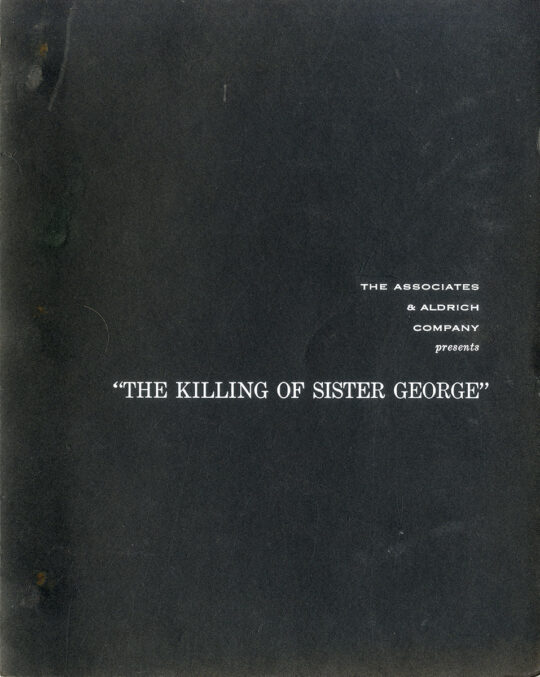
KILLING OF SISTER GEORGE, THE (1968) Film script
$3,000.00 Add to cart -
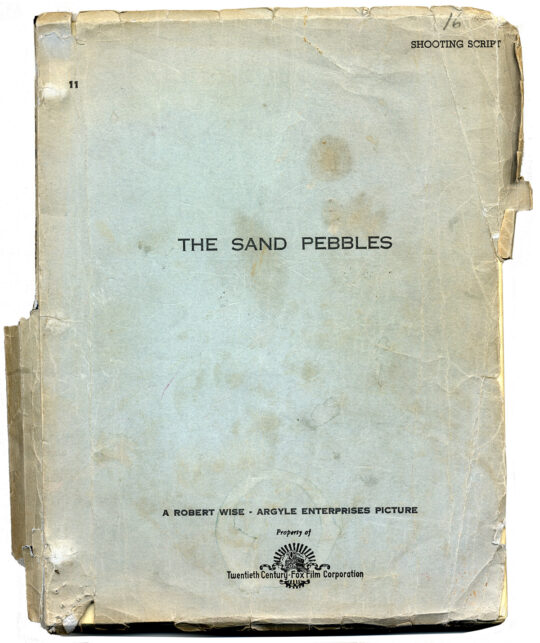
SAND PEBBLES, THE (Nov 1, 1965) Shooting script by Robert Anderson
$1,150.00 Add to cart -
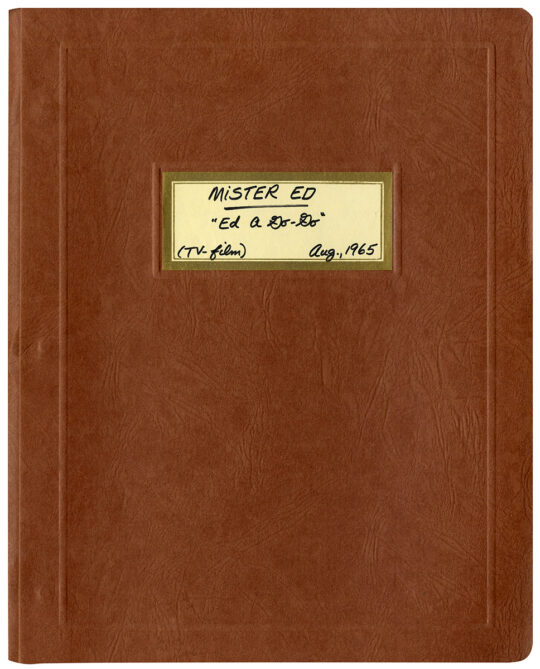
MISTER ED – “ED A GO-GO” (1965) TV script signed by Johnny Crawford
$325.00 Add to cart -
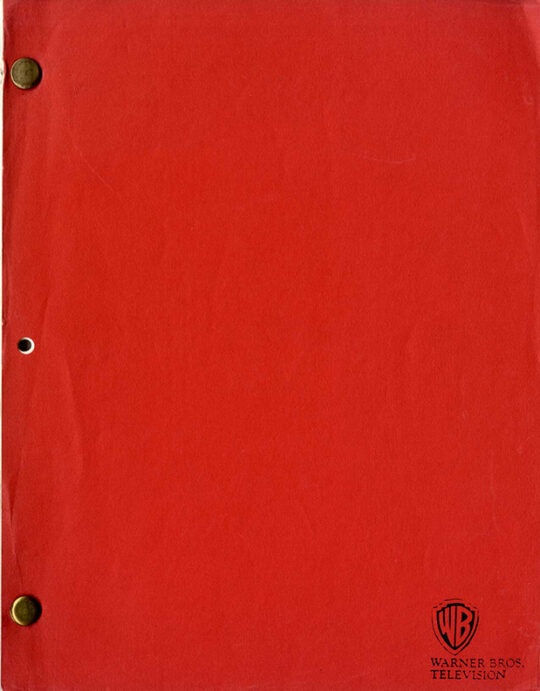
DRESS GRAY (Mar 6, 1981) Second revision script by Gore Vidal
$500.00 Add to cart

